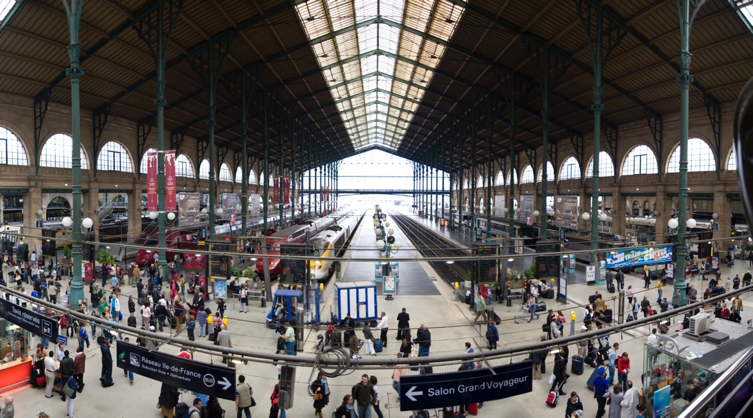As part of the European Big Data Value Forum, SystemX and Ifsttar will organize a workshop on November 23 from 9:00 am to 10:30 am, on the following topic: “Data, Mobility and Public Transport”.
Objectives
The goal of the workshop is to bring together experts to present and discuss macro issues related to the contribution of data sciences to understanding mobilities and to improve the quality of public transport by exposing the underlying scientific challenges illustrated on several usecases.
In recent decades, demographic growth, urban sprawl, increasing road congestion, and the desire to reduce environmental pollution have been responsible for the emergence of new sustainable urban policies in mobility. The public authorities play a significant role in this, giving impetus to sustainable urban practices which aim to increase the use of sustainable modes of transport such as public transport, walking, cycling, bike-sharing, car-sharing and car-pooling. Within this context, based on the development of smart technologies and the advent of new observation capabilities, massive urban datasets are collected by a variety of urban sensors (e.g. smartphones, Automatic Fare Collection, Wi-Fi or Bluetooth records, geo-tagged posts on social networks, etc). Analysis of such data can greatly benefit mobility studies and help to build decision-making tools for analytical, forecasting and display purposes. One of the main challenges of the “city of tomorrow” is the ability to achieve real-time control of mobility systems in order to optimize the city operation, better meet future needs through improved forecasting and better match the supply of mobility services to citizen demands.
The purpose of this workshop is to bring together recent studies in the field of data science and urban mobility. In particular, one of the main problematic to be addressed by this workshop is how to leverage Data Science for a better knowledge of the mobility user / customer needs, objectify the use and maintenance of assets, provide keys for decision-making support for operators, help for providing targeted and highly customized services.
Agenda
Moderator: Latifa Oukhellou – Ifsttar
| 9:00 | Welcome and introduction Latifa Oukhellou, Ifsttar, Marne-la-Vallée |
| 9:05 | Widening AI: Automated End-to-End Machine Learning in Transport Luis Moreira Matias, NEC Laboratories Europe, Heidelberg |
| 9:20 | How data science may improve mobility experiences? Maguelonne Chandesris, SNCF Innovation & Research, Paris |
| 9:35 | How AutoMat, the Vehicle Big Data Marketplace, Improves Road Quality by enhancing the safety of highways for Public Authorities? Heike Weiss, Here Technologies, Paris / Victor Corral, ATOS Research & Innovation, Sevilla |
| 9:50 | Applications and Challenges of Smartphone-based Mobility Data Acquisition Peter Widhalm, AIT, Wien |
| 10:05 | The challenge of Mobility as a Service (MaaS) and the use of big data Jean-Charles Pandazis, ERTICO-ITS Europe |
| 10:20 | Closing note and summary Jakob Puchinger, IRT SystemX, Saclay |
Biographies
Latifa Oukhellou (Ifsttar)
 Latifa Oukhellou received a Ph.D. from Paris-Sud University in 1997 and “Habilitation à diriger des Recherches” from Paris-Est University in 2010. She is currently a Senior Researcher at the French Institute of Science and Technology for Transport, Development and Networks (Ifsttar) in France and has been Assistant Professor at University of Paris-Est Créteil (UPEC). Her research interests concern pattern recognition, machine learning and information fusion applied to diagnosis problems as well as to spatio-temporal data mining for identifying driving behavior, analyzing urban mobility or monitoring energy and water smart grids. She is involved in several research projects in the field of intelligent transportation systems or urban computing for smart cities.
Latifa Oukhellou received a Ph.D. from Paris-Sud University in 1997 and “Habilitation à diriger des Recherches” from Paris-Est University in 2010. She is currently a Senior Researcher at the French Institute of Science and Technology for Transport, Development and Networks (Ifsttar) in France and has been Assistant Professor at University of Paris-Est Créteil (UPEC). Her research interests concern pattern recognition, machine learning and information fusion applied to diagnosis problems as well as to spatio-temporal data mining for identifying driving behavior, analyzing urban mobility or monitoring energy and water smart grids. She is involved in several research projects in the field of intelligent transportation systems or urban computing for smart cities.
Luis Moreira Matias (NEC Laboratories Europe)
Widening AI: Automated End-to-End Machine Learning in Transport
 Dr. Luis Moreira-Matias received his Ms.c. degree in Informatics Engineering and Ph.d. degree in Computer Science (major in Machine Learning) from the University of Porto, in 2009 and 2015, respectively. During his studies, he won an International Data Mining competition held during a Research Summer School at TU Dortmund (2012). Luis encloses a successful track record of real-world deployment of AI-based software products across EMEA and APAC. Currently, he is Senior Researcher at NEC Laboratories Europe (Heidelberg, Germany), where he is fortunate to lead R&D of AI-based software for Transport, Retail and Fintech industries. His interests include Machine Learning, Data Mining and Predictive Analytics in general.
Dr. Luis Moreira-Matias received his Ms.c. degree in Informatics Engineering and Ph.d. degree in Computer Science (major in Machine Learning) from the University of Porto, in 2009 and 2015, respectively. During his studies, he won an International Data Mining competition held during a Research Summer School at TU Dortmund (2012). Luis encloses a successful track record of real-world deployment of AI-based software products across EMEA and APAC. Currently, he is Senior Researcher at NEC Laboratories Europe (Heidelberg, Germany), where he is fortunate to lead R&D of AI-based software for Transport, Retail and Fintech industries. His interests include Machine Learning, Data Mining and Predictive Analytics in general.
Maguelonne Chandesris (SNCF Innovation & Research Department, Paris)
How data science may improve mobility experiences?
 Maguelonne Chandesris is responsible for the “Data Mobility and Territories” theme in Innovation & Research Department in SNCF group. She holds a Ph.D. from Pierre and Marie Curie University (UPMC) in mathematics and is a graduate of the National School of Statistics and Information Analysis (ENSAI). She is in charge of the “Statistics, Econometrics and Datamining” team, which develops solutions for advanced statistical processing and visualization of large volumes of data at the service of various activities of the SNCF group.
Maguelonne Chandesris is responsible for the “Data Mobility and Territories” theme in Innovation & Research Department in SNCF group. She holds a Ph.D. from Pierre and Marie Curie University (UPMC) in mathematics and is a graduate of the National School of Statistics and Information Analysis (ENSAI). She is in charge of the “Statistics, Econometrics and Datamining” team, which develops solutions for advanced statistical processing and visualization of large volumes of data at the service of various activities of the SNCF group.
Heike Weiss (Here Technologies, Paris), Victor Corral (ATOS Research & Innovation, Sevilla)
How AutoMat, the Vehicle Big Data Marketplace, Improves Road Quality by enhancing the safety of highways for Public Authorities?
 Heike Weiss is Global Product Marketing Director Core Map at Here Technologies. She is working in the geolocation industry for 14 years and 20 years for international marketing in B2B and B2C environment. Leading Core Map and content product global product marketing since 2 years. Successful definition and execution of marketing strategies with optimum use of budget and resources to deliver market and revenue objectives. Educated to European Master of Management
Heike Weiss is Global Product Marketing Director Core Map at Here Technologies. She is working in the geolocation industry for 14 years and 20 years for international marketing in B2B and B2C environment. Leading Core Map and content product global product marketing since 2 years. Successful definition and execution of marketing strategies with optimum use of budget and resources to deliver market and revenue objectives. Educated to European Master of Management
Peter Widhalm (AIT, Wien)
Applications and Challenges of Smartphone-based Mobility Data Acquisition
 Peter Widhalm is a Data Scientist affiliated with the Center for Mobility Systems at the Austrian Institute of Technology. After his studies of Computational Intelligence at the Vienna University of Technology he started his career as software architect for geographic information systems. In 2009 he joined AIT, where he developed and published and number of contributions for vision-based trajectory analysis and unusual event detection, human activity patterns inferred from cell phone signal data and a software system for multi-modal trip reconstruction from smartphone sensor data.
Peter Widhalm is a Data Scientist affiliated with the Center for Mobility Systems at the Austrian Institute of Technology. After his studies of Computational Intelligence at the Vienna University of Technology he started his career as software architect for geographic information systems. In 2009 he joined AIT, where he developed and published and number of contributions for vision-based trajectory analysis and unusual event detection, human activity patterns inferred from cell phone signal data and a software system for multi-modal trip reconstruction from smartphone sensor data.
Jean-Charles Pandazis (ERTICO-ITS Europe)
The challenge of Mobility as a Service (MaaS) and the use of big data
 Jean-Charles Pandazis, joined ERTICO in 2009 as Head of Department Clean & Urban Mobility. He holds a Master degree in Electrical Engineering from the EPF-Lausanne and from the Georgia Institute of Technology in Atlanta. He built his career at Bosch Corporate Research in the field of Driver Assistance with focus on predictive navigation. With ERTICO he coordinated the EU Project eCoMove and now optiTruck. Mobility as a Service (MaaS) is a key activity in his department and ERTICO is coordinating the MaaS Alliance.
Jean-Charles Pandazis, joined ERTICO in 2009 as Head of Department Clean & Urban Mobility. He holds a Master degree in Electrical Engineering from the EPF-Lausanne and from the Georgia Institute of Technology in Atlanta. He built his career at Bosch Corporate Research in the field of Driver Assistance with focus on predictive navigation. With ERTICO he coordinated the EU Project eCoMove and now optiTruck. Mobility as a Service (MaaS) is a key activity in his department and ERTICO is coordinating the MaaS Alliance.
Jakob Puchinger (IRT SystemX / CentraleSupélec)
J akob Puchinger is the Anthropolis Chair Holder, Senior Scientist and Professor at CentraleSupélec. Before coming to Paris, Jakob Puchinger was head of the business unit Dynamic Transportation Systems at the Mobility Department of the Austrian Institute of Technology where he was leading a team of 40 researchers developing solutions to better understand and steadily improve dynamic transport systems. After completing his doctoral studies at the TU Vienna in 2006, Jakob Puchinger worked at the NICTA Research Centre at the University of Melbourne. He joined the Austrian Institute of Technology in 2008. Until his nomination as Head of Business Unit in 2014, he was a Senior Scientist focusing on research in transport optimization and logistics, authoring more than 30 scientific publications. Jakob Puchinger additionally held a position as external lecturer at TU Vienna, regularly offering a course on optimization methods for transport logistics.
akob Puchinger is the Anthropolis Chair Holder, Senior Scientist and Professor at CentraleSupélec. Before coming to Paris, Jakob Puchinger was head of the business unit Dynamic Transportation Systems at the Mobility Department of the Austrian Institute of Technology where he was leading a team of 40 researchers developing solutions to better understand and steadily improve dynamic transport systems. After completing his doctoral studies at the TU Vienna in 2006, Jakob Puchinger worked at the NICTA Research Centre at the University of Melbourne. He joined the Austrian Institute of Technology in 2008. Until his nomination as Head of Business Unit in 2014, he was a Senior Scientist focusing on research in transport optimization and logistics, authoring more than 30 scientific publications. Jakob Puchinger additionally held a position as external lecturer at TU Vienna, regularly offering a course on optimization methods for transport logistics.


![[Video] Interview with Dimitra Politaki](https://www.irt-systemx.fr/wp-content/uploads/2025/05/Capture-décran-2025-05-23-à-14.31.26.png)

